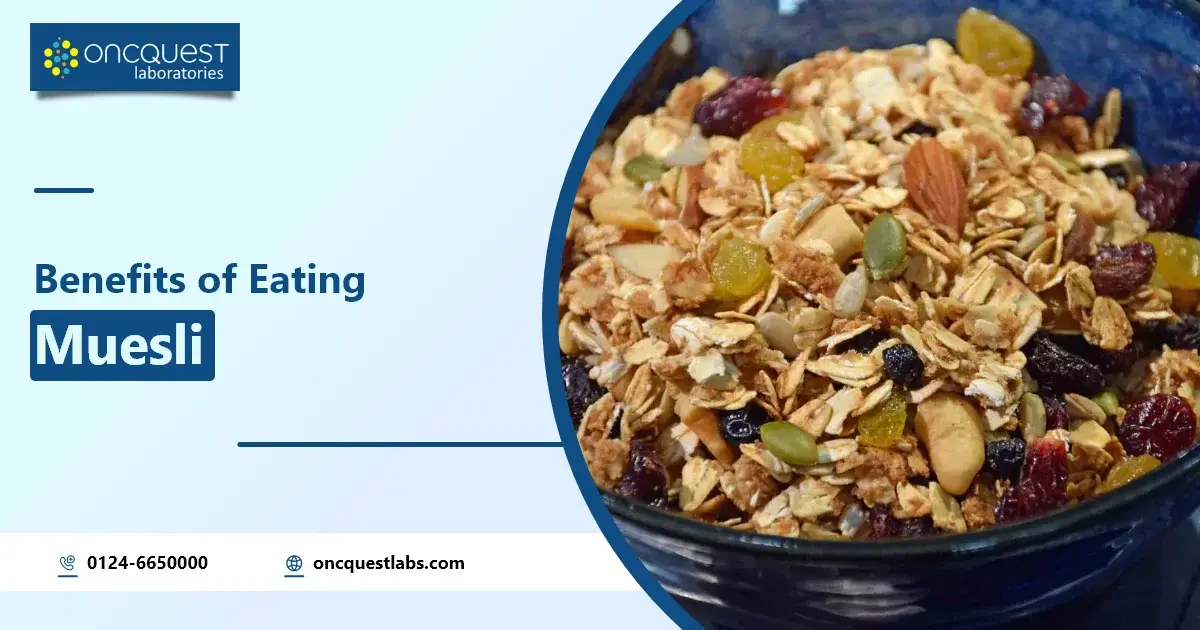Muesli is a popular and nutritious breakfast option that combines rolled oats, nuts, seeds, and dried fruits. Originally developed by Swiss physician Maximilian Bircher-Brenner, muesli has gained widespread acclaim for its health benefits and versatility. Packed with essential nutrients, including fiber, vitamins, and minerals, muesli offers a balanced start to the day and supports overall well-being. Its blend of ingredients provides a range of health benefits, from promoting digestive health to boosting energy levels. In this article, we will explore the various advantages of incorporating muesli into your diet and how it can contribute to a healthier lifestyle.
Contents
Nutritional Value of Muesli
Here is a table outlining the typical nutritional value of muesli per 100 grams:
| Nutrient | Amount per 100 grams |
| Calories | 350 kcal |
| Water | 5% |
| Protein | 10 grams |
| Total Fat | 6 grams |
| Saturated Fat | 1 gram |
| Monounsaturated Fat | 2.5 grams |
| Polyunsaturated Fat | 2 grams |
| Carbohydrates | 60 grams |
| Dietary Fiber | 8 grams |
| Sugars | 10 grams |
| Vitamin B1 (Thiamine) | 0.5 mg |
| Vitamin B2 (Riboflavin) | 0.3 mg |
| Vitamin B3 (Niacin) | 1 mg |
| Vitamin E | 1.5 mg |
| Calcium | 50 mg |
| Iron | 4 mg |
| Magnesium | 80 mg |
| Phosphorus | 90 mg |
| Potassium | 300 mg |
| Sodium | 10 mg |
This table provides a general idea of the nutritional content of muesli, highlighting its rich source of fiber, protein, and essential minerals. Keep in mind that the exact values can vary depending on the specific ingredients and brand of muesli.
Benefits of Eating Muesli
Eating muesli provides several health benefits due to its diverse and nutrient-rich ingredients. Here’s a deep dive into its various advantages:
Supports Digestive Health
Muesli is a significant source of dietary fiber, primarily from oats, nuts, and seeds. This fiber plays a crucial role in promoting digestive health. It adds bulk to the stool, which helps prevent constipation and ensures regular bowel movements. The soluble fiber in oats forms a gel-like substance that can help in softening the stool, making it easier to pass. Additionally, the insoluble fiber found in seeds and nuts supports overall gut health by acting as a prebiotic, which nourishes beneficial gut bacteria. A healthy gut microbiome contributes to improved digestion and can reduce the risk of gastrointestinal disorders.
Promotes Heart Health
Muesli supports cardiovascular health through its combination of oats and nuts. Oats contain beta-glucan, a type of soluble fiber that has been shown to lower LDL (bad) cholesterol levels. By reducing LDL cholesterol, muesli helps prevent the buildup of plaques in the arteries, thereby reducing the risk of heart disease. Nuts, which are rich in healthy fats, further contribute to heart health by providing monounsaturated and polyunsaturated fats. These fats help improve overall lipid profiles and reduce inflammation, which are crucial for maintaining a healthy heart.
Aids in Weight Management
Muesli is beneficial for weight management due to its high fiber content and balanced macronutrient profile. The dietary fiber in muesli helps increase satiety, or the feeling of fullness, which can help control appetite and reduce the likelihood of overeating. By providing a steady release of energy through complex carbohydrates, muesli helps maintain stable blood sugar levels, preventing energy crashes and excessive hunger. This balanced energy release makes muesli a satisfying breakfast option that can support weight loss or maintenance efforts.
Boosts Energy Levels
The complex carbohydrates in muesli provide a steady and sustained release of energy. Unlike simple carbohydrates, which can lead to rapid spikes and drops in blood sugar levels, the slow-digesting carbs in muesli help maintain stable glucose levels throughout the morning. This steady energy release helps prevent fatigue and supports physical and mental performance throughout the day. The combination of oats, nuts, and seeds also provides essential nutrients that support energy metabolism, further enhancing overall vitality.
Enhances Bone Health
Muesli contains essential minerals such as calcium, magnesium, and phosphorus, which are crucial for maintaining strong bones. Calcium is a primary component of bone tissue and helps in the formation and maintenance of bone density. Magnesium and phosphorus are also vital for bone health as they play roles in bone mineralization and calcium metabolism. Some muesli varieties are fortified with additional vitamins like Vitamin D, which aids in calcium absorption, further supporting bone strength and reducing the risk of osteoporosis.
Supports Immune Function
The vitamins and antioxidants found in muesli, including Vitamin C and Vitamin E, play a significant role in supporting immune function. Vitamin C is known for its ability to enhance the production and function of white blood cells, which are crucial for defending the body against infections. Vitamin E acts as a powerful antioxidant, protecting immune cells from oxidative stress and damage. Additionally, the minerals and phytonutrients in nuts and seeds contribute to overall immune health, helping the body stay resilient against diseases.
Improves Skin Health
Muesli’s antioxidant-rich ingredients contribute to healthy skin. Vitamins such as Vitamin E, found in nuts and seeds, help protect the skin from oxidative damage caused by free radicals. This protection can reduce signs of aging, such as wrinkles and fine lines. The healthy fats in muesli also support skin hydration and elasticity, promoting a smooth and youthful complexion. The combination of these nutrients helps maintain overall skin health and appearance.
Regulates Blood Sugar Levels
Muesli has a low glycemic index, which means it causes a slower, more gradual rise in blood sugar levels compared to high-glycemic foods. The complex carbohydrates and fiber in muesli contribute to this slow release of glucose, helping to stabilize blood sugar levels. This regulation is particularly beneficial for individuals with diabetes or those managing blood sugar levels, as it can help prevent spikes and drops in glucose levels and improve overall glycemic control.
Incorporating muesli into your diet can provide these extensive health benefits while offering a nutritious and satisfying meal option. Its rich blend of fibers, vitamins, minerals, and antioxidants makes it a valuable addition to a balanced diet.
Potential Side Effects and Precautions
While muesli offers numerous health benefits, it’s important to be aware of potential side effects and precautions:
Digestive Discomfort
High Fiber Content: Muesli’s high fiber content, particularly from oats, nuts, and seeds, can sometimes lead to digestive discomfort. For individuals who are not used to a high-fiber diet, this may cause bloating, gas, or abdominal cramps. It’s advisable to gradually increase fiber intake and drink plenty of water to help mitigate these issues.
Allergic Reactions
Nuts and Seeds: Muesli often contains various nuts and seeds, which can be allergens for some individuals. Common allergens include almonds, walnuts, and sesame seeds. If you have a known allergy to these ingredients, it’s crucial to check the muesli label or opt for nut-free varieties.
Calorie Intake
Portion Control: Muesli can be calorie-dense, especially if it includes high amounts of nuts and dried fruits. Overconsumption can lead to excessive calorie intake, which may contribute to weight gain. It’s important to monitor portion sizes and consider muesli as part of a balanced diet.
Added Sugars
Sweetened Varieties: Some commercial muesli products contain added sugars or sweeteners, which can negate the health benefits. Excess sugar intake is associated with various health issues, including weight gain and metabolic disorders. Opt for unsweetened or lightly sweetened muesli to avoid these risks.
How Do you Cook Muesli?
Cooking muesli is simple and can be adapted to suit your taste and dietary preferences. To start, measure out the desired amount of muesli—typically, a serving is around 1 cup. Combine it with a liquid of your choice, such as milk, almond milk, or water. The ratio of muesli to liquid can vary based on how thick or creamy you prefer your muesli; generally, 1 cup of muesli to 1 to 1.5 cups of liquid works well.
For a basic preparation, heat the liquid in a saucepan over medium heat until it starts to simmer, then stir in the muesli. Reduce the heat to low and cook for about 5-10 minutes, stirring occasionally, until the muesli has absorbed the liquid and reached your desired consistency. You can add sweeteners like honey or maple syrup, and spices such as cinnamon or nutmeg, according to your taste.
Once cooked, serve the muesli warm, topped with fresh fruits, nuts, seeds, or yogurt. Alternatively, for a cold version, let the mixture cool and refrigerate it overnight to allow the flavors to meld and the oats to soften. This method, known as overnight oats, provides a convenient, no-cook option that’s ready to eat in the morning.
Conclusion
Incorporating muesli into your diet offers a variety of health benefits, including improved digestive health, heart health, and energy levels. Its rich nutritional profile, featuring fiber, vitamins, minerals, and antioxidants, makes it a versatile and nourishing choice for breakfast or snacks. Whether enjoyed hot or cold, muesli can be easily customized with your favorite fruits, nuts, and seeds to suit your taste and dietary needs. However, it’s important to be mindful of potential side effects such as digestive discomfort or high calorie content, and to choose muesli with minimal added sugars and allergens. By making informed choices and incorporating muesli as part of a balanced diet, you can enjoy its numerous health benefits while maintaining overall wellness.





